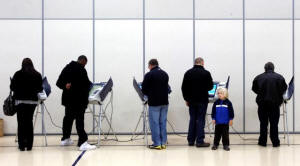|
Supreme Court leaves Ohio voting
restrictions in place
 Send a link to a friend
Send a link to a friend
 [September 14, 2016]
By Lawrence Hurley [September 14, 2016]
By Lawrence Hurley
WASHINGTON (Reuters) - The Supreme Court on
Tuesday refused to reinstate for the Nov. 8 general election Ohio's
"Golden Week", which had allowed voters to register and cast ballots
within the same seven-day period before it was repealed by a
Republican-backed law two years ago.
Ohio Democrats had challenged the repeal on grounds that it
discriminated against black voters, and had taken their case to the
nation's highest court after the Cincinnati-based 6th U.S. Circuit Court
of Appeals had ruled against them in August.
The law was one of numerous measures enacted in recent years in
Republican-governed states that Democrats and civil rights activists
have said were intended to hamper voters, including African-Americans
and Hispanics, who tend to favor Democratic candidates.
"Ohio Republicans can keep trying to make it harder for people to vote,
but we will continue to fight them at every turn," Ohio Democratic Party
Chairman David Pepper said.
Ohio Secretary of State Jon Husted, a Republican, countered that state
election laws had made Ohio less vulnerable to voter fraud and "one of
the easiest states in the nation in which to register and cast your
ballot."

The appeals court had reversed a May ruling by a U.S. district judge who
blocked repeal of Golden Week, finding that the 2014 law violated
voters' rights.
The Supreme Court's brief order did not note any dissenting votes on the
short-handed eight-member court, evenly divided between liberal and
conservative justices.
Ohio's Republican-controlled legislature abolished Golden Week while
also shortening the state's early-voting period, during which ballots
could be cast before an election, to four weeks from five weeks. Ohio
often is a pivotal state in U.S. presidential elections.
In a separate Ohio voting-rights case decided on Tuesday by the 6th
Circuit, a three-judge panel issued a split ruling.
Siding with a lower court, the appeals panel struck down a 2014
requirement that local election officials toss out absentee and
provisional ballots if they contain an address or birth date that fails
to perfectly match voting records.
But the panel reversed the lower court in upholding provisions
restricting the assistance that poll workers can offer voters and
reducing the number of days absentee voters have to remedy
identification-envelope errors.
[to top of second column] |

Voters cast their ballots at Legend Elementary School during the
U.S. presidential election in Newark, Ohio November 6, 2012.
REUTERS/Matt Sullivan

Golden Week was created to make it easier to vote in Ohio after
lengthy lines at polling locations marred the 2004 election. In
2008, 60,000 people voted during Golden Week, and 80,000 did so in
2012.
The law erasing Golden Week was initially challenged in court by the
American Civil Liberties Union and the National Association for the
Advancement of Colored People.
In 2014, in an earlier round of litigation, the Supreme Court voted
5-4 to allow the repeal to take effect for that year's election.
The case is one of several voting disputes being litigated ahead of
the November election and is the third application for emergency
action to reach the Supreme Court in recent weeks from three
different states. The justices have rejected all three.
On Aug. 31, the court rejected a bid by North Carolina to reinstate
several voting restrictions, including a requirement that people
show identification at the polls.
Last Friday, the court rejected an effort by Michigan to reinstate a
ban on "straight ticket" voting, the practice of using one mark to
vote for all candidates from one party.
(Reporting by Lawrence Hurley; Additional reporting by Kim Palmer in
Cleveland; Editing by Will Dunham)
[© 2016 Thomson Reuters. All rights
reserved.]
Copyright 2016 Reuters. All rights reserved. This material may not be published,
broadcast, rewritten or redistributed.
 |